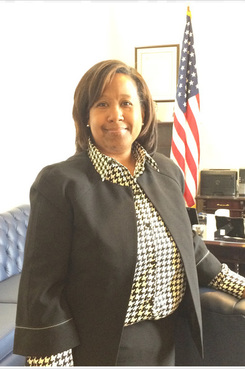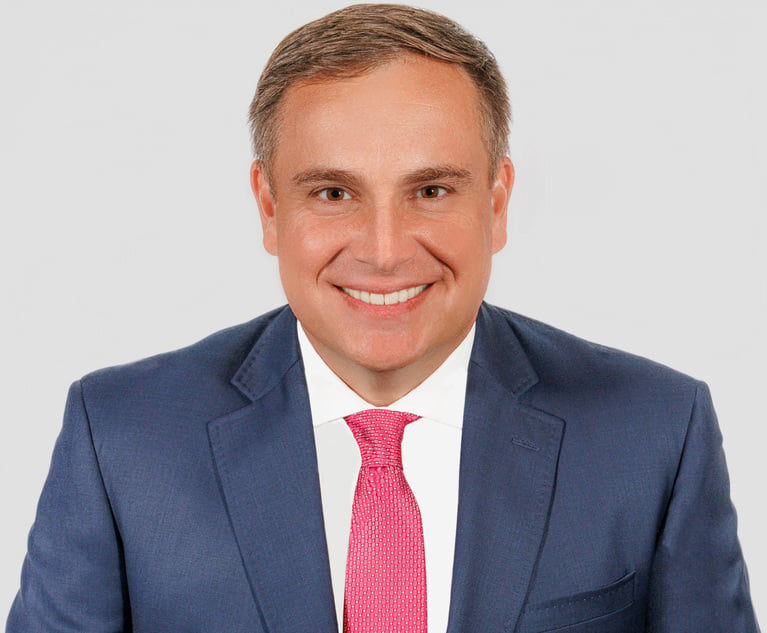Q&A: Kelley Hodge, Back in Private Practice, on Steering DA's Office Through Trying Times
In an interview with The Legal, Kelley Hodge reflected on the work she did to help restore order to the office following a tumultuous period and how that experience will inform her career going forward.
February 14, 2018 at 05:02 PM
5 minute read
 Kelley Hodge.
Kelley Hodge. After a roughly six-month stint as Philadelphia's interim district attorney following the downfall of former top prosecutor Seth Williams, Kelley Hodge is back in her previous role as of counsel to Elliott Greenleaf, having handed the District Attorney's Office over to its newly elected leader, Larry Krasner.
In an interview with The Legal, Hodge reflected on the work she did to help restore order to the office following a tumultuous period and how that experience will inform her career going forward.
The interview has been lightly edited for length and clarity.
Q: What was the mood like when you took over the District Attorney's Office and how did it change during your time there?
A: From my perspective, coming back into the office and having knowledge of the office, people were very optimistic with my arrival in hoping the focus could be on their work and no longer on things they had no control over. I would like to think that during my time we were engaging with the community, and the lawyers could display the professionalism and work that they were proud of.
Q: Do you think you were successful in making an impact of lasting change?
A: Yes. My desire was to lead the office to a better state than the day I walked in, speaking of the public's confidence in the office and awareness of what the office does beyond the trying of cases. The public wasn't aware of the office's want to advocate for victims and better assist them. The mission of the office is to try to reduce crime, and I was hoping to have an impact. I think I did that, but there are many things [for which] I can only plant the seed. I definitely felt there were things that were important and of value to me that I wanted to take an initial step to elevate and address.
Q: What would you consider your biggest accomplishment during your time as interim DA?
A: My focus and purpose in serving was to make sure the mission of the office was fulfilled by those who worked in the office and support staff that represented the office. I took the step of saying, “What is it that we're doing within the community, and what is it we can try to do to expand our reach so more people are aware of what the office can provide for the community?”
I had interface meetings around the entire city with a cross-section of interface leaders because I recognize the significance of [face time] in communities. People are more comfortable meeting with familiar faces to get guidance on difficult issues, and a lot of those issues are things the Criminal Justice Center deals with.
I felt it was a good forward step to have the community turn to us to alleviate concerns. We all have the same thing we want: an improvement in personal life. Reaching out was a natural extension of the hand. It was a mutual extension to see what affirmative steps we could plant to help the community at large.
Q: Do you think the initiatives you enacted will be continued effectively under the new administration?
A: Along with the other things, I launched a hate crimes task force in the office so attorneys could be a point person working with victims' services. That, interface meetings, and any other type of engagement, such as addressing the Title IX issue in schools, were important initiatives to me. But it's up to current staff to move it forward. I hope they do, and I trust that they will make whatever steps they see as a priority during their time.
Q: What specifically did you do to aid in the transition of the Krasner administration? Do you think it went smoothly as intended?
A: The office and myself were made available and open to either candidate and their team. We were more than happy to do whatever we could as an office to help the transition, so long as it was permissible. I reached out to Krasner and [Republican candidate Beth] Grossman prior to election results to make sure that as soon as the results were announced they would be welcome in the office.
Q: Why did you choose to return to Elliott Greenleaf?
A: Elliott Greenleaf is a very well established law firm that I had the privilege of working in. It was natural to continue to work back into the space. They let me continue in the work I'm interested in. The level of respect is there to exhibit great lawyering. It's a place where I can learn and grow and make a contribution.
Q: What did you learn from your time as interim DA that you will bring back to your practice?
A: There are many things, but to highlight one, it's the need to try to strike balance in the work and analyze angles, gather as much information as possible to proceed on the matter, and make sure you're doing it with the appropriate analysis to reach a goal.
Q: Do you hope to run for public office or go back to government at any point in the future?
A: I am definitely intrigued by the possibility of returning to a position in public office or government, but right now, I want to focus on the work at hand. But I would not exclude considering making a step forward in the future.
This content has been archived. It is available through our partners, LexisNexis® and Bloomberg Law.
To view this content, please continue to their sites.
Not a Lexis Subscriber?
Subscribe Now
Not a Bloomberg Law Subscriber?
Subscribe Now
NOT FOR REPRINT
© 2025 ALM Global, LLC, All Rights Reserved. Request academic re-use from www.copyright.com. All other uses, submit a request to [email protected]. For more information visit Asset & Logo Licensing.
You Might Like
View All



Ozempic Defendants Seek to Shave 'Tacked On' Claims From MDL Complaint
3 minute readTrending Stories
Who Got The Work
J. Brugh Lower of Gibbons has entered an appearance for industrial equipment supplier Devco Corporation in a pending trademark infringement lawsuit. The suit, accusing the defendant of selling knock-off Graco products, was filed Dec. 18 in New Jersey District Court by Rivkin Radler on behalf of Graco Inc. and Graco Minnesota. The case, assigned to U.S. District Judge Zahid N. Quraishi, is 3:24-cv-11294, Graco Inc. et al v. Devco Corporation.
Who Got The Work
Rebecca Maller-Stein and Kent A. Yalowitz of Arnold & Porter Kaye Scholer have entered their appearances for Hanaco Venture Capital and its executives, Lior Prosor and David Frankel, in a pending securities lawsuit. The action, filed on Dec. 24 in New York Southern District Court by Zell, Aron & Co. on behalf of Goldeneye Advisors, accuses the defendants of negligently and fraudulently managing the plaintiff's $1 million investment. The case, assigned to U.S. District Judge Vernon S. Broderick, is 1:24-cv-09918, Goldeneye Advisors, LLC v. Hanaco Venture Capital, Ltd. et al.
Who Got The Work
Attorneys from A&O Shearman has stepped in as defense counsel for Toronto-Dominion Bank and other defendants in a pending securities class action. The suit, filed Dec. 11 in New York Southern District Court by Bleichmar Fonti & Auld, accuses the defendants of concealing the bank's 'pervasive' deficiencies in regards to its compliance with the Bank Secrecy Act and the quality of its anti-money laundering controls. The case, assigned to U.S. District Judge Arun Subramanian, is 1:24-cv-09445, Gonzalez v. The Toronto-Dominion Bank et al.
Who Got The Work
Crown Castle International, a Pennsylvania company providing shared communications infrastructure, has turned to Luke D. Wolf of Gordon Rees Scully Mansukhani to fend off a pending breach-of-contract lawsuit. The court action, filed Nov. 25 in Michigan Eastern District Court by Hooper Hathaway PC on behalf of The Town Residences LLC, accuses Crown Castle of failing to transfer approximately $30,000 in utility payments from T-Mobile in breach of a roof-top lease and assignment agreement. The case, assigned to U.S. District Judge Susan K. Declercq, is 2:24-cv-13131, The Town Residences LLC v. T-Mobile US, Inc. et al.
Who Got The Work
Wilfred P. Coronato and Daniel M. Schwartz of McCarter & English have stepped in as defense counsel to Electrolux Home Products Inc. in a pending product liability lawsuit. The court action, filed Nov. 26 in New York Eastern District Court by Poulos Lopiccolo PC and Nagel Rice LLP on behalf of David Stern, alleges that the defendant's refrigerators’ drawers and shelving repeatedly break and fall apart within months after purchase. The case, assigned to U.S. District Judge Joan M. Azrack, is 2:24-cv-08204, Stern v. Electrolux Home Products, Inc.
Featured Firms
Law Offices of Gary Martin Hays & Associates, P.C.
(470) 294-1674
Law Offices of Mark E. Salomone
(857) 444-6468
Smith & Hassler
(713) 739-1250





